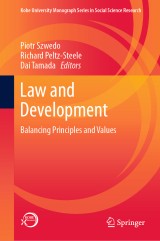Details

Law and Development
Balancing Principles and ValuesKobe University Monograph Series in Social Science Research
|
117,69 € |
|
| Verlag: | Springer |
| Format: | |
| Veröffentl.: | 14.09.2019 |
| ISBN/EAN: | 9789811394232 |
| Sprache: | englisch |
Dieses eBook enthält ein Wasserzeichen.
Beschreibungen
<p>This book examines the concept of ‘development’ from alternative perspectives and analyzes how different approaches influence law. ‘Sustainable development’ focuses on balancing economic progress, environmental protection, individual rights, and collective interests. It requires a holistic approach to human beings in their individual and social dimensions, which can be seen as a reference to ‘integral human development’ – a concept found in ethics. ‘Development’ can be considered as a value or a goal. But it also has a normative dimension influencing lawmaking and legal application; it is a rule of interpretation, which harmonizes the application of conflicting norms, and which is often based on the ethical and anthropological assumptions of the decision maker. This research examines how different approaches to ‘development’ and their impact on law can coexist in pluralistic and multicultural societies, and how to evaluate their legitimacy, analyzing the problem from an overarchingtheoretical perspective. It also discusses case studies stemming from different branches of law.</p>
Introduction.- Part I CONCEPTUALIZING DEVELOPMENT.- Tomáš Gábriš, “Law and Development” in the Light of Philosophy of (Legal) History.- Christine Mengès le Pape, Populorum Progressio, Development and Law?.- Flavio Felice, Luca Sandonà, Luigi Sturzo’s Socio-Economic Development Theory and the Case of Italy: No Prophet in His Homeland.- Part II DEVELOPMENT AND FINANCE.- 4. George Garvey, International Financial Aid, Catholic Social Doctrine and Sustainable Integral Human Development.- 5. Zuzanna Selementová, Common But Differentiated Responsibilities for Developed and Developing States: A South African Perspective.- 6. Dai Tamada, Must Investment Contribute to the Economic Development of the Host State?: Scrutinizing Salini.- Part III DEVELOPMENT AND SOCIETY.- 7. Franck Duhautoy, Water: The Common Heritage of Mankind?.- 8. Richard Peltz-Steele, Gaspar Kot, Private-Sector Transparency as Development Imperative: An African Inspiration.- 9. Adam Szafrański, Piotr Szwedo, Małgorzata Klein, Between Economic Development and Human Rights: Balancing E-Commerce and Adult Content Internet Filtering.- Part IV APPLIED SUSTAINABLE DEVELOPMENT.- 10. Ermanno Calzolaio, A Comparative Law Approach to the Notion of Sustainable Development: An Example from Urban Planning Law.- 11. Jan Glazewski, Challenges Concerning ‘Development’: A Case-Study on Subsistence and Small-Scale Fisheries in South Africa.- 12. Wojciech Bańczyk, Economic and Social Development in the Republic of South Africa’s New Model of Mineral Rights: Balancing Private Ownership, Community Rights, and Sovereignty.- 13. Daniel Zatorski, Sustainable Development as a New Trade Usage in International Sale of Goods Contracts.<p></p>
<div><br></div><div>This book examines the concept of ‘development’ from alternative perspectives and analyzes how different approaches influence law. ‘Sustainable development’ focuses on balancing economic progress, environmental protection, individual rights, and collective interests. It requires a holistic approach to human beings in their individual and social dimensions, which can be seen as a reference to ‘integral human development’ – a concept found in ethics. ‘Development’ can be considered as a value or a goal. But it also has a normative dimension influencing lawmaking and legal application; it is a rule of interpretation, which harmonizes the application of conflicting norms, and which is often based on the ethical and anthropological assumptions of the decision maker. This research examines how different approaches to ‘development’ and their impact on law can coexist in pluralistic and multicultural societies, and how to evaluate their legitimacy, analyzing the problem from an overarching theoretical perspective. It also discusses case studies stemming from different branches of law.</div><div> </div><div><br></div>
Presents a multidisciplinary perspective with practical research based on different branches of law Explains the complexities of different meanings of development, e.g., in the context of sustainable development and integral human development Combines an overarching theoretical perspective with case studies related to law, economics, environmental protection, and human rights


















